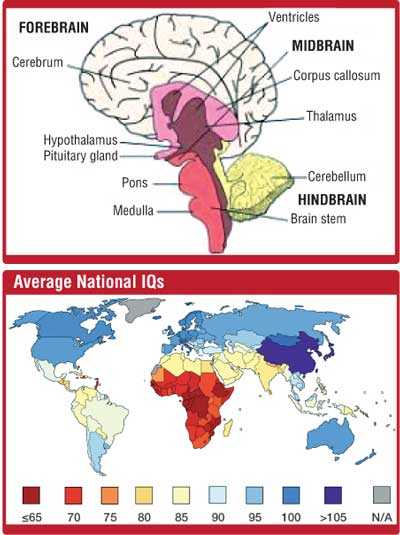Friday Feb 20, 2026
Friday Feb 20, 2026
Thursday, 10 January 2019 00:37 - - {{hitsCtrl.values.hits}}
Today four technology revolutions are on the cards and of the lot the most recent is neurotechnology. Neurotechnology is adding to biotechnology, nanotechnology and information technology.
This technology really addresses the core essence of humanity – human brain and combines with advances taking place in information technology is opening up new vistas. As a result perhaps in not-too-distant future we may witness cognitive computing.
 It has to be stated that the fundamental scientific aspects of neuroscience came out in the last century. Once there was this tongue-in-cheek email that was circulating about the brain of a Sri Lankan that had fetched the highest price among all the related anatomical specimens but from different nations that had been placed on for sale.
It has to be stated that the fundamental scientific aspects of neuroscience came out in the last century. Once there was this tongue-in-cheek email that was circulating about the brain of a Sri Lankan that had fetched the highest price among all the related anatomical specimens but from different nations that had been placed on for sale.
Upon inquiry what had come to light is all the other deceased from different nationalities had actually maximised its use hence the disposal value is almost nil whereas Sri Lankan brain had been identified to be the least used and hence the reason for grossing the highest price.
The story touches on the use of grey matter and we look at quotients such as Intelligence Quotient (IQ), Emotional Quotient (EQ), etc. in selecting personnel and in planning. With multibillion dollar projects in European Union and in USA there is serious interest on the human brain and cognitive sciences and the technologies such as Artificial Intelligence (AI) are quite hot topics.
We need science literacy in our society
We know that the human brain is unique in the animal kingdom and there had been additions to this specific organ as we evolved over millennia. The additions over the years have given us our unique human characteristics and the frontal part of the brain – the prefrontal cortex – is the clump of biomass that helps us in this differentiation with the other animals. The additions mean that we have the reptilian brain within our brain too and still attend to our basic needs through that.
Of course sometime back the advances of biotechnology especially in genetics informed us of our closer connectivity to those around us, for example there is 99% matching in terms of genetic makeup of us to a chimpanzee. One can also say that a banana plant there may be 60% genetic similarity. Interesting data and can a banana plant evolve to be a human being one day!? This is science literacy that we must have in our society.
The scientific Sri Lankan is by and large is still missing. We believe in astrology rather than in astronomy, the use of horoscopes over telescopes, cricket rather than chess, cartoons over puzzles and the list can go on. With such embedded mismatches in interests whether the Flynn effect is applicable in our society is a question.
Intelligence quotient worrisome
It is indeed worrisome when you see the nation’s league table for intelligence quotient. Of course unlike in North America and in Europe the serious immersion into knowing the intelligent quotient and IQ as it is more widely known is missing in Sri Lanka. We however, cannot ignore when measurements are taken, assessed, compared across nations and then subsequently published and released for all to see.
The latest available to be accessed is from a joint UK and Finnish study from 2002-06, the results of which however have been much debated too. IQ is a score derived from tests designed to assess human intelligence with the concept dating back to 1905. 1912 witnessed the book on the subject by a German psychologist who came up with a quantitative approach. Using a person’s mental age score divided by the actual age and then multiplying by 100 provides the IQ score.
The mental age score is what is realised through the application of tests. An IQ score of 100 indicates the average accepted as the standard. Two-thirds of the population will thus be between 85 and 115 IQ. Further another 2.5% of the population will have scores above 130 – the gifted – and another 2.5% below 70 – the challenged. It is also known that the IQ score tend to improve as new generations come by (Flynn effect) – IQ scores to rise at an average rate that scales to 3 IQ points per decade.
Decline of IQ
Rising IQ I am sure that no one would be worried about. There had been the observation of a reverse trend too which is of falling IQ! Now that is worrying. Imagine the gifted reducing and the challenged increasing. If that would not worry a decision maker who values human resources as central to the progress of a country, I am not sure what would. 
The reversal – the decline of IQ – has been observed in many a European country including Britain. How these trends come to light is when societies engage in long term measurements of their subjects. Needless to say that when excellent scores come from a society that can really be a smart society. A cluster with high IQ values many mean something special.
Now with data from different societal cross sections from different countries can position countries in a scale. Most recent world ranking of countries by their average IQ with data from 80 countries places Hong Kong and Singapore in joint first place with a country IQ average of 108. It is interesting to note that all top positions are taken up by Asian countries with South Korea, Japan and China following.
Of the sub-continent countries Pakistan is at 24th place (IQ-84) followed by India and Bangladesh (25th place, IQ- 82). You have to go further down to spot Sri Lanka, which is lying at 28th place sharing the place with Guatemala and Zimbabwe with an IQ score of 79.
It is interesting to read the introduction to the Sri Lanka web page. The country at the bottom of the pile is Equatorial Guinea in the 43rd place with an IQ score of 59. We know that IQ scores are not precise scores and are quite subjective and also IQ does not capture all cognitive aspects. Yet one cannot help if one thinks can the overall economic success or the existing situations be linked to IQ scores at least in dictating the general positioning?
This is an old argument – extrapolating IQ scores to predict future scenarios such as national income. Brain after all is one organ among many and an individual is much more than the brain itself. Yet in neuroscience this is perhaps the mother of all organs and we know what a brain dead situation can do to you!
IQ may not be everything
Perhaps one may not worry to the extent the title may be depicting. IQ may not be everything and I think we can agree on that. The person with the highest IQ so far recorded is Marilyn vos Savant who is a magazine columnist in USA and she is listed in the Guinness Book of World Records.
If the question is posed in general one may be excused if one ventures with the answer Albert Einstein or Steven Hawkins – having heard about them so much. We know that Einstein’s brain was kept separately and had been studied. The IQ of the gifted and the celebrities are in general found to be high. However, the IQ score cannot be directly extrapolated to mean many things either.
Two people once met and decided to set up an organisation for the high IQs to join and today there is MENSA with a global membership. The membership opens up if you complete a standard test and for those in the top segment. It was interesting that in 2016 a 10-year-old girl – Nishi Uggalle born to a Sri Lankan family in UK who hailed from Padukka, obtained the maximum score of 162 and became eligible to MENSA membership and that was a headline making event – that was a no mean feat!

A small but a significant lesson
If you note the comment made in the website from a historical perspective with the current figures, there is something that needs to be done, something we need to do. The environment perhaps was conducive for her to come out and succeed.
Today we have epigenetics too indicating that purely the genes are not enough and the environment too matters. That is a small but a significant lesson – there may be the buried or hidden abilities but we must change our way of work and interactions to stimulate positive changes. We need to get back the Flynn effect in our society.